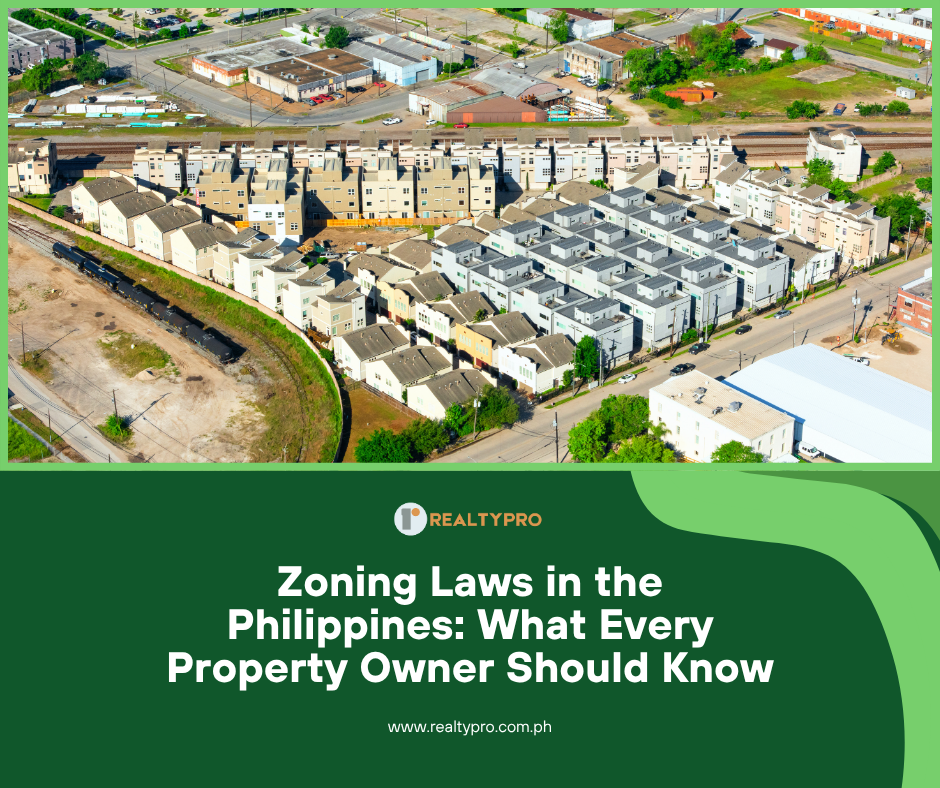Zoning Laws in the Philippines: What Every Property Owner Should Know
Understanding the Rules That Shape Our Communities
If you’ve ever wondered why certain areas in the city are filled with high-rise condominiums while others are mostly residential houses or industrial zones, you can thank (or blame) zoning laws. These are the invisible rules that shape our communities—dictating where you can build, what you can build, and how you can use your property. For every property owner, developer, or even future homeowner, understanding zoning laws in the Philippines is not just useful—it’s essential.
What Are Zoning Laws?
Zoning laws are local government regulations that divide a city or municipality into different zones—residential, commercial, industrial, agricultural, institutional, and others. Each zone comes with its own rules on what kind of buildings or activities are allowed.
These laws are part of a broader system called the Comprehensive Land Use Plan (CLUP), which serves as the blueprint for a community’s growth and development. The Department of Human Settlements and Urban Development (DHSUD) provides the national framework, but every Local Government Unit (LGU) has the authority to implement and enforce its own zoning ordinance.
Why Zoning Matters to Property Owners
Knowing the zoning classification of your property can save you from costly mistakes or legal troubles. Here’s why:
- Permitted Use – Each zone has designated land uses. For example, if your property is classified as “residential,” you can’t just turn it into a mini-mall or factory. You need a reclassification or special permit from the LGU.
- Building Restrictions – Zoning laws often dictate the height of buildings, the distance from property lines (setbacks), and even the design. If you plan to construct or renovate, you’ll need to comply with these to secure a building permit.
- Property Value – Zoning can greatly influence your property’s value. Commercial zones usually have higher land prices than purely residential areas because of business potential.
- Environmental and Safety Compliance – Zoning regulations also aim to prevent hazards by separating incompatible land uses—like keeping residential areas away from industrial zones or flood-prone areas.
How to Check Your Property’s Zoning Classification
To find out your property’s zoning classification, visit your City or Municipal Planning and Development Office. They can provide you with a Zoning Certificate or a Locational Clearance, which is often required before building, renovating, or applying for business permits.
It’s also wise to review the CLUP or zoning map of your area. Some LGUs have made these documents available online, while others require an in-person visit.
What Happens If You Violate Zoning Laws?
Violating zoning ordinances can lead to serious consequences. Depending on the gravity, the LGU may issue a cease and desist order, revoke your permits, or impose fines. In extreme cases, they can even demolish non-compliant structures. It’s always best to consult the local zoning office before making any major property decisions.
Can Zoning Classifications Be Changed?
Yes, but it’s not an overnight process. Property owners can apply for rezoning or reclassification, especially if the area’s character has changed over time or the existing classification no longer fits its economic potential. The application undergoes review by the local zoning board and must align with the city’s development plan.
Conclusion: Know the Rules Before You Build
Zoning laws aren’t there to make life harder—they’re designed to keep communities safe, organized, and thriving. For property owners, awareness of these rules is power. It ensures your investment is protected and your plans won’t clash with local ordinances.
Sa totoo lang, minsan nakakainis nga naman ang dami ng permits at regulations. Pero kung iisipin mo, ito rin ang nagbibigay ng order sa bawat barangay, city, at bayan. Kaya bago ka magpatayo ng bahay, magbukas ng negosyo, o bumili ng lote, siguraduhin mong alam mo kung anong “zone” ka. Hindi lang ito legal requirement—ito’y gabay para maging maayos, ligtas, at sulit ang iyong property investment sa long run.
For Legal and Real Estate Assistance, Click Here
#rltypro

